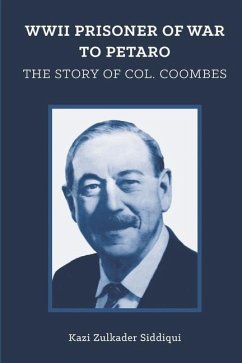This is a story of a British war hero whose military career was aborted by an unfortunate event after the end of World War II, which led him to become one of the finest educators in Pakistan.The Fall of Singapore on 15th February 1942 to the Imperial Japanese Army. was without a doubt one of the greatest setbacks for the Allied forces in Southeast Asia during World War II. It was the largest surrender of Allied forces in history led by the Royal British Army―a surrender of 80,000 men including the Indian and Australian forces. This was in addition to the nearly 50,000 men that were captured and imprisoned by the Japanese earlier in the Malayan Campaign. Capt. Coombes was one of the officers taken prisoner at the Fall of Singapore, and he remained incarcerated until the end of the war in 1945. The book describes the inhuman treatment of the prisoners of war at the hands of the Japanese for three and a half years between 1942 and 1945, which led to the torture and deaths of tens of thousands of British, Australian and Indian prisoners of war, and local Malay and Thai civilians. It also brings out some wonderful stories and examples of how the prisoners stuck together to support each other and bringing out the best of human values. The railway line constructed by these prisoners is often referred to as "Death Railway" or the Thai-Burma Railway. This line was built in the River Kwai valley. The bridge built near Tamekam (Tamarkan) was immortalized in the 1957 movie "The Bridge on the River Kwai", which mixes fiction with history. Coombes account brings out the real incidents of the construction of the railway and the bridge. Coombes was an amazing man without a doubt. He was a rising star in the British Army after the World War II and may have attained the heights in his military career which was aborted by an unfortunate incident in Singapore. That incident proved to be a boon for Pakistan. While he was a colonel, he was sidelined in the UK, and Pakistan acquired him to become one of the finest educators who built a great educational institution - Cadet College Petaro - that is established on sound principles and a solid foundation. Unfortunately, his massive achievement in a country that is thousands of miles away from the UK remains unrecognized in his home country.
Hinweis: Dieser Artikel kann nur an eine deutsche Lieferadresse ausgeliefert werden.
Hinweis: Dieser Artikel kann nur an eine deutsche Lieferadresse ausgeliefert werden.








